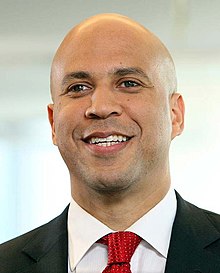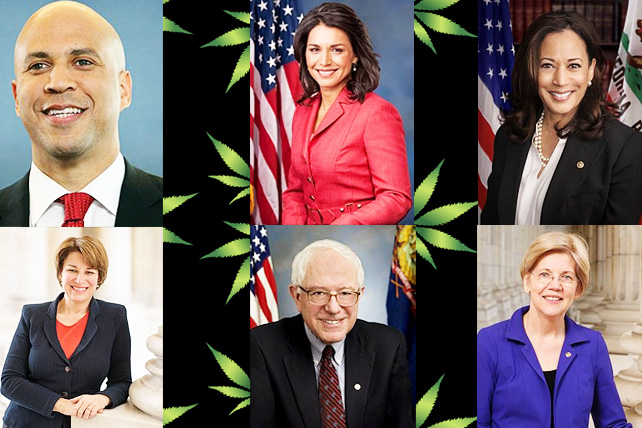The push for drug policy reform, particularly cannabis legalisation, has become increasingly popular on the US left since the 2016 election. Many of the main candidates for President Trump’s challenger in 2020 have pledged progressive reform – but for some, their records don’t match up with their rhetoric.
Here’s a brief overview of what some of the leading candidates for the Democratic nomination in the 2020 Presidential election have had to say about drug policy…
Cory Booker

Senator Cory Booker of New Jersey has been a longstanding advocate for progressive drug policy reform.
In a Reddit AMA (“Ask Me Anything” interview), he described the US war on drugs as an “absolute failure [that] is consuming gross amounts of our national treasure and destroying the lives of millions of people that could, with the right policy, be far more productive in our society”. Separately, he has stated that people found in possession of drugs for personal use should be "referred to drug treatment" instead of facing fines or jail terms.
He has denounced the racially disproportionate implementation of the drug war, noting that Black and Latinx people are incarcerated at far greater rates than Whites for drug offences, "even though blacks and Latinos engage in drug offenses at a rate no different than whites". He also supports ending mandatory minimum sentences for people who commit drug offences.
Booker is the lead sponsor of the Marijuana Justice Act, a bill which intends to end the federal prohibition of cannabis, and he has regularly supported legislation to protect medical cannabis patients from federal enforcement.
Tulsi Gabbard

Congresswoman Tulsi Gabbard of Hawaii has consistently supported progressive cannabis reform, including by cosponsoring a bill that would end the federal prohibition of cannabis, and campaigning for improved access to medical cannabis for patients.
She has denounced the US drug war for putting “people in prison for smoking marijuana while allowing corporations like Purdue Pharma, who are responsible for the opioid-related deaths of thousands of people, to walk away scot-free with their coffers full”.
In 2018, she joined Senator Bernie Sanders in introducing legislation to hold pharmaceutical companies accountable for profiting from the opioid overdose crisis in the US.
Kamala Harris

Senator Kamala Harris of California has had a mixed approach to drug policy over the years.
She recently stated that she supports “dismantling the failed war on drugs – starting with legalising marijuana”, marking a significant change from when – in 2014 – she declined to support legalisation in her home state and laughed at a reporter’s question on the subject.
During her six-year tenure as Attorney General of California, she pushed for more racial bias training among police officers, but also refused to join other states’ attempts to remove cannabis from the Drug Enforcement Agency's (DEA) list of most dangerous substances.
On related criminal justice issues, Harris has been widely criticised for supporting harsh, punitive approaches. As California AG, she appealed against the abolition of the death penalty, opposed investigations of officer-involved shootings, and supported legislation that disproportionately affected communities of colour, as the New York Times reports.
Amy Klobuchar

Senator Amy Klobuchar of Minnesota has endorsed legislation – put forward by Senator Elizabeth Warren – to protect states legalising cannabis from federal interference, and has supported access to medical cannabis for patients in need.
Klobuchar has also supported intensifying the US’ prohibitionist approach to illegal opioids, particularly fentanyl. In 2017, she was original co-sponsor of the STOP Act, which she described as giving “law enforcement the tools they need to help curb the trafficking of synthetic drugs and keep them away from our communities”. The bill was endorsed and signed into law by President Trump in 2018.
Bernie Sanders

Senator Bernie Sanders of Vermont has broadly supported progressive drug policy reform for many decades.
In a 1972 senatorial campaign in Vermont, he pledged to “abolish all laws dealing with abortion, drugs, [and] sexual behaviour”, although he no longer voices support for legalising all drugs.
Sanders has long-supported cannabis reform. In 1995, he cosponsored a bill to legalise medical cannabis at the federal level, and – in 2015 – he filed the first ever bill to end the federal prohibition of the drug. He has consistently advocated for all non-violent cannabis offences to be expunged from people’s records in jurisdictions where cannabis prohibition has ended. Nationwide cannabis legalisation is a cornerstone of his current campaign.
He has slammed the drug war for having harmed "millions of lives through the arrest and jailing of people for nonviolent crimes", and has sharply criticised the approach's disproportionate impact upon people of colour.
He has also opposed the imprisonment of people for problematic drug use. In his 2016 book, Our Revolution, he wrote: “People are dying every day from overdose. But the solution is not to lock up addicts. We have to treat substance abuse as a serious public health issue rather than a criminal issue, so that all people – regardless of their income – can get the help they need.”
Elizabeth Warren

Warren has also demonstrated a strong desire for broader criminal justice reform.
“We need criminal justice reform and we need it now,” her website states. “That means ending racial disparities in our justice system. It means banning private prisons. It means embracing community policing and demilitarising our local police forces. It means comprehensive sentencing reform and rewriting our laws to decriminalise marijuana.”
—
Primaries and caucuses for the Democratic nomination will begin in early 2020.


